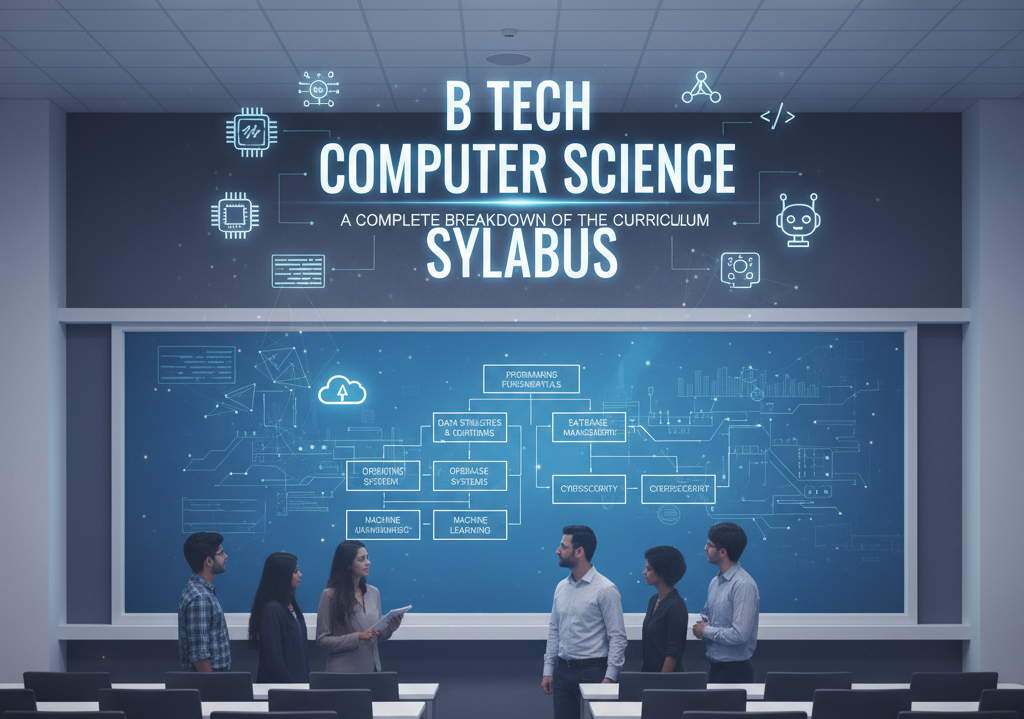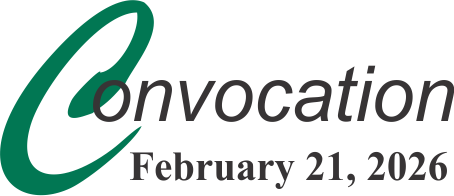
The B.Tech. Computer Science is one of the most popular engineering degrees, and it is designed to create professionals who can create, manage, and innovate technology systems. For many, the Computer Science curriculum can be intimidating at first because of its variety of fields and technical depth. This guide aims to simplify the BTech CSE subjects in a structured, easy-to-comprehend format, year by year. This article will guide you in understanding the way in which the Computer Science engineering syllabus moves from the fundamentals of programming and mathematics to specialisation areas of study, such as Artificial Intelligence, Cybersecurity, and Cloud Computing, to prepare you for the real-world challenges presented by the tech industry.
Year 1: The Basics of Computer Science Engineering
The B.Tech Computer Science curriculum in the first year is designed to impart strong foundational concepts.
Key Subjects:
- Programming Fundamentals: Basics of programming using C or Python, including logic formation, control structures, functions, and data types. That is the step to coding success.
- Mathematics courses: Including Calculus, Linear Algebra, and Discrete Mathematics, provide the theoretical foundation for concepts in algorithms and data analysis.
- Core Engineering Sciences: Including Applied Chemistry, Engineering Physics, and Basic Electrical Engineering, provide a much broader perspective for students beyond computing.
- Labs & Practicals: Labs enable students to simulate and debug code, as well as write more efficient code.
The students will have established a solid foundation for advancing in the Computer Science program by the end of this year.
Year 2: The Core Subjects of Computer Science Engineering
The second year of the Computer Science engineering syllabus delves deeply into computing. Students begin working on critical concepts that will shape their problem-solving ability and technical expertise.
Key Subjects:
- Data Structures & Algorithms (DSA): Definitely one of those core BTech CSE subjects, DSA covers the ways that data can be efficiently stored and used.
- Object-Oriented Programming (OOP): Using languages like Java or C++, students learn how to design scalable and reusable code.
- Database Management Systems (DBMS): This covers relational databases, SQL, and principles for organising data.
- Operating Systems (OS): How systems handle hardware, memory, and processes.
- Computer Networks: This course offers an introduction to the concepts behind protocols, communication models, and internet architecture.
By this stage, students are well-equipped to understand how computers function internally and interact with their external environment. The B. Tech Computer Science syllabus ensures that this year builds the foundation for advanced learning.
Year 3: Advanced Learning
The third year of the Computer Science curriculum is a transition year, in which students evolve from general topics to specialisation. Students are exposed to cutting-edge computing in a balanced program of theory, application, and electives.
Key Subjects:
- Theory of Computation: Investigates the mathematical underpinnings of what problems computers can (and cannot) solve.
- Software Engineering: The professional approach to software design, development, and testing.
- Compiler Design: Focuses on how programming languages are translated into machine code.
Electives and Specialisations:
- Artificial Intelligence & Machine Learning (AI/ML): Among the most trending subjects in the BTech CSE syllabus, AI/ML enables machines to learn from data and make intelligent predictions.
- Cybersecurity: Protecting and securing systems and networks from threats is one of the most essential BTech CSE subjects in the present digital era.
- Web & Mobile Technologies: Students learn how to create responsive web applications and mobile apps that are leading to some of the most in-demand jobs.
This stage of the Computer Science engineering syllabus is where students often begin to align their academic path with their career aspirations.
Year 4: Ready for Careers
And in the last year, it is when the students start to tie all of this together and get ready to go out into the professional world.
Key Components:
- Capstone Project: Students undertake a significant project that showcases their mastery of the Computer Science curriculum and skills as applied in the real world.
- Internships/Industrial Training: Hands-on experience in IT companies/startups can be a perfect bridge for the gap between academic training and IT industry requirements.
- Advanced Electives: Cloud Computing, Blockchain, and Big Data are offered as choices for intensive study from a niche market perspective.
- Soft Skills: In addition to technical skills, communication, project management, and teamwork are developed to enable students to be ready for a career.
The fourth year of the Computer Science engineering syllabus is about transitioning from being a student to becoming a competent professional.
Skills and Tools Taught to the CSE Students Through the B.Tech CSE Elective Courses.
The elective subjects in the BTech Computer Science syllabus offer you the opportunity to acquire specific knowledge and skills relevant to industry. Among the most popular options, Cloud Computing and Blockchain stand out as high-demand areas that enhance employability.
Cloud Computing
Students acquire skills in developing, deploying, and managing scalable applications on cloud platforms. Computer Science’s curriculum presents students with tools such as:
- AWS, Microsoft Azure, Google Cloud Platform (GCP): For managing and deploying your cloud services.
- Virtualisation Tools (VMware, Docker, Kubernetes): To manage containers and orchestrate services.
- Big Data Integration: Experience with Cloud-based data analytics, Hadoop, or Spark.
Students are equipped with these skills to work as cloud architects, DevOps engineers, and cloud consultants.
Blockchain
The Computer Science engineering syllabus also includes blockchain electives to educate students on decentralised technologies and secure transaction systems. Tools and frameworks include:
- Ethereum & Hyperledger Fabric: Used for decentralised app (dApp) development.
- Solidity: A programming language for writing smart contracts.
- Some Cryptographic Tools: The basics of hash functions, digital signatures, and Public Key Infrastructure.
- Algorithms for Consensus: Proof-of-Work, Proof-of-Stake, and other mechanisms for maintaining trust.
When combined with core BTech CSE subjects, students get hands-on experience in emerging areas that are shaping and revolutionising industries such as finance, healthcare, and supply chain management.
Career Opportunities After BTech. Computer Science
BTech Computer Science graduates have the widest and highest-paying career opportunities in the technology industry. Because the Computer Science curriculum combines theory and practical applications, graduates are well-equipped to pursue a variety of traditional IT roles as well as emerging fields.
Popular Career Paths:
- Software Developer/Engineer: Creating applications, platforms, and enterprise systems.
- Data Scientist/Analyst: Using mathematics, statistics, and programming to interpret large datasets.
- Cybersecurity Analyst: Securing computer systems from malicious threats, violations, and attacks.
- Cloud Engineer: Building and maintaining scalable cloud infrastructure.
- AI/ML Engineer: Applying algorithms and neural networks to build intelligent solutions.
- Full-Stack Developer: Combining web and mobile technologies for end-to-end application development.
The BTech CSE subjects provide the versatility needed in startups, multinational corporations, research organisations, and even government IT sectors.
How Specialisations Influence the Career Prospects of Computer Science Engineers?
The third and fourth years of the BTech Computer Science syllabus often allow students to specialise in specific domains. These specialisations significantly shape future opportunities.
- Artificial Intelligence & Machine Learning: Creates jobs in autonomous systems, predictive analytics, and natural language processing.
- Cybersecurity: Prepare for a career in ethical hacking, network security, and risk management.
- Cloud Computing and Big Data: Provides jobs in big data management, infrastructure design, and enterprise IT.
- Web & Mobile Technologies: Paves the way in app development, UI/UX design, and front-end/back-end engineering.
By selecting electives appropriately in the Computer Science engineering syllabus, they can tailor their learning towards industries that are in high demand. This flexibility means that students not only follow the BTech CSE subjects, but also tailor themselves for niche roles that also pay high salaries.
Support Systems for Internships and Projects
The final academic year of the Computer Science curriculum marks a transition to the real world. Universities and institutions typically provide structured support systems to help students transition into careers.
Key Resources Available:
- Placement Cells: Every engineering college has a dedicated placement cell that assists students and provides internships and job opportunities.
- Industry Partnerships: The association with the IT companies brings real-life work and problem-solving in the curriculum.
- Faculty Oversight: Professors and mentors work closely with students as they develop their capstone projects to ensure academic and industry quality standards are maintained.
- Hackathons & Competitions: Events hosted by universities or companies provide students with an opportunity to apply their BTech CSE subjects in practical, competitive environments.
- Alumni Support Systems: Senior graduates often guide current students in selecting projects, internships, and career paths.
These support mechanisms ensure that students completing the Computer Science engineering syllabus are industry-ready and confident in applying their skills.
Conclusion
From mathematics and programming in the first year, through projects and internships, to rounding it all up in the final year, the BTech Computer Science syllabus is a complete academic journey. The structured flow of the Computer Science curriculum ensures that students are prepared for advanced roles in AI, Data Science, Cybersecurity, or Software Development. The key to success lies not just in following the prescribed B Tech CSE subjects but also in exploring personal projects, internships, and certifications. The Computer Science Engineering syllabus is a roadmap, but your curiosity and passion will decide how far you go in this digital era.
FAQs


